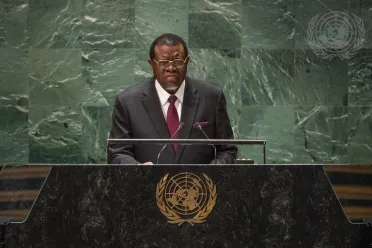Statement
Statement summary
HAGE G. GEINGOB, President of Namibia, said that with the onset of COVID-19, the number of people living in extreme poverty rose for the first time in a generation. “Indeed, the world is in a state of flux and progress is uneven,” he added. The “terrifying” gap between the wealthy and the marginalized is not just a moral concern, but a threat to global stability. Pandemics have long been formidable adversaries that disproportionately wreak havoc on the socio-economic fabric of developing countries. These crises go beyond their immediate health implications, unravelling years of development, straining health-care systems and exacerbating existing socio-economic disparities. “We need to change the status quo. To do so, we must end vaccine apartheid,” he continued. Further, he urged for the removal of intellectual property barriers and stronger commitments from wealthy nations on investments in manufacturing to enable vaccine production in the Global South.
Advocating for gender equality is not only a matter of fairness; it is an essential step towards unlocking innovation, diversity and social cohesion, he continued. In addition to having 44 per cent female representation in Parliament, Namibia has women in the positions of Prime Minister and Deputy Prime Minister, and two thirds of its key banking institutions are headed by women. Turning to rapid advances in technology, he said quantum computing and artificial intelligence are transforming the global landscape, offering unprecedented challenges and opportunities for growth and development. “Access to technology can bridge gaps in education, health care and economic development, propelling nations towards progress,” he went on to say.
Consistent with their pledges made at the 2015 United Nations Climate Change Conference in Paris, developed nations must provide financial support to enable developing countries to shift to cleaner energy sources, he emphasized. For its part, Namibia has attracted new industries looking to make use of clean electricity. One such example is the Oshivela project, which plans to use Namibian-produced green hydrogen to deliver the first industrial production of iron at net-zero emissions, he said. Oshivela will be one of the biggest primary production sites of green iron in the world and is expected to sequestrate 27,000 tons of carbon dioxide emissions per year, equivalent to 50 per cent of the carbon dioxide emissions of Namibia’s entire power industry today. Furthermore, Namibia is developing green shipping corridors for zero-carbon shipping.
On another matter, he called the embargo against Cuba unjust and urged it be lifted. The United States must remove Cuba from the list of State sponsors of terrorism. Selective punitive measures against Zimbabwe and Venezuela must also be lifted, as these measures constitute the greatest obstacle to the implementation of the 2030 Agenda for Sustainable Development. The Charter of the United Nations reflects the commonly agreed upon values of diplomacy and peaceful coexistence. While Namibia’s right to self-determination has been upheld, the people of Western Sahara continue to remain under occupation, he said. Recalling how Morocco supported Namibia’s right to self-determination, he urged Rabat “to do the same” for the people of Western Sahara. Similarly, the people of Palestine yearn to transition from the inhumane conditions of oppressive rule, he also added.
In his address, President Hage G. Geingob of Namibia highlighted his country’s efforts in transitioning to green energy, emphasizing its green hydrogen projects and their potential to decarbonize hard-to-abate sectors.
He noted Namibia’s plans to develop green shipping corridors in partnership with other key stakeholders, aiming to create carbon-neutral maritime value chains for clean fuel and products.
President Geingob also noted the impacts of COVID-19 and its lingering aftermath, that pushed many across the world into extreme poverty, as well as worsening inequalities.
“The terrifying gap between the wealthy and the marginalized is not just a moral concern, but also a threat to global stability and harmony,” he said. urging efforts from all countries to create an environment where prosperity is shared and is inclusive.
Full statement
Read the full statement, in PDF format.
Photo

Previous sessions
Access the statements from previous sessions.
